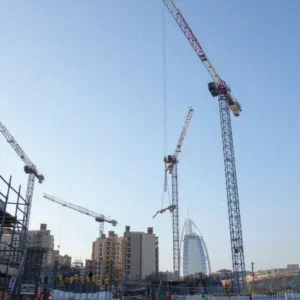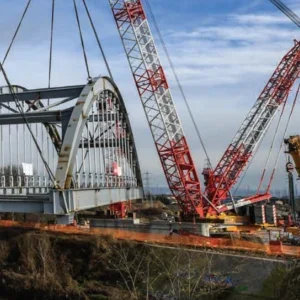Much of UK’s engineering industry has endured a difficult few years, exacerbated by the strength of the pound relative to currencies in export markets. Grove’s Sunderland plant, the former Coles factory, was a high profile casualty at the end of last year. Britain’s crawler crane manufacturers are struggling against a tide of grey imports of questionable legality that have held back R-B International to roughly half the UK sales it could otherwise have expected to have made in the UK last year, according to sales director Paul Ross.
There is one crane manufacturer in the UK, however, that is enjoying a degree of success in bucking the trend: Atlas Hydraulic Loaders, the UK subsidiary of Atlas Weyhausen GmbH of Germany.
Atlas Weyhausen began its life in 1919 making agricultural attachments. In the late 1950s the German company started making purpose-designed excavators and truck loader cranes. The UK business was established in 1963.
“When Atlas Weyhausen gave birth to its UK daughter company 36 years ago it made a very wise move,” says Bob Webster, who joined Atlas Hydraulic Loaders in October last year as managing director.
“If you want to succeed in an important market like the UK, you have to be immersed in it. As a UK company we understand how our products are used here, how their purchase is financed here, what customers’ expectations are and how these factors are changing with time.” The UK factory was originally based in Blackwood, Lanarkshire but has since relocated to Hamilton, a little nearer to Glasgow. A manufacturing plant was first set up in Hamilton in the early 1990s to deliver a large military contract for more than 300 units. In more recent times, Blackwood has been closed down and Hamilton has been the focus of considerable investment. It is a consolidation that Webster says should be seen as a springboard for expansion, not retrenchment.
Atlas Hydraulic Loaders lays claim to being the clear leader in the UK loader crane market, with a turnover in the region of around £30m ($48m). It manufactures about 2,000 cranes a year, Webster says, of which about 800 are exported. It also makes a four model range of mini excavators. (The idea of combining the mini-excavators and loader cranes to make a mini crawler crane has been raised, apparently, but not been received with any great enthusiasm by the Atlas decision makers.) The crane strategy is to have a modular range which can be adapted for each end-user, rather than offer all-purpose cranes, as some manufacturers do, says Webster. Consequently, as much as 75% or 80% of production by value is custom-built cranes.
With the market moving into the early stages of maturity, end-users increasingly know precisely what they want. Usually, the customer specifies the crane and Atlas then works with the truck body builder.
This approach is partly driven by the changing use of truck loaders. German roofing contractors, for example, are now operating ‘just in time’ principles, Webster says, and they use a truck loader with a long reach to deliver palletised loads straight onto the roof instead off-loading onto the site and lifting up to the roof in a separate operation. He says that truck loader manufacturers have to anticipate this kind of application-led product development.
A second key strand in the Atlas strategy is concentrating on after-sales service and support. Atlas has 70 service engineers in the UK “which is probably two or three times anyone else,” he claims.
“We reckon we can give buyers anything they want. I think we are already the best service organisation in the UK loader crane market, and my intention is to make it even better.”






